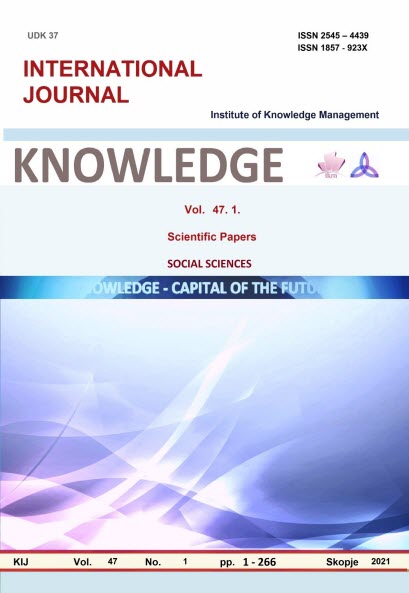BUSINESS CONSULTING AS A FACTOR OF KNOWLEDGE IMPROVEMENT IN HUMAN RESOURCES MANAGEMENT
BUSINESS CONSULTING AS A FACTOR OF KNOWLEDGE IMPROVEMENT IN HUMAN RESOURCES MANAGEMENT
Author(s): Branko Mihailović, Katica RADOSAVLJEVIĆ, Vesna Ž. PopovićSubject(s): Business Economy / Management
Published by: Scientific Institute of Management and Knowledge
Keywords: Business consulting; human resource management; knowledge management; creative management; knowledge transfer
Summary/Abstract: This paper investigates the role of business consulting in the creation and transfer of business knowledge to human resources in companies. Consulting interventions are focused on the effective management of the client's knowledge organization. The goal of launching a knowledge management initiative is to improve the performance of the organization and individuals through the identification, adoption, evaluation and transfer of knowledge. The model of creative management is based on the philosophical assumption that the real world, which surrounds modern organizations, is dynamic, turbulent and changeable and that, as such, it requires organizations and their management to perform complex activities. These activities require Serbian managers not only to solve problems caused by uncertainty, but also to recognize and take advantage of new business opportunities. During business consulting projects, employees can be engaged in a number of learning activities, but it is crucial to transfer new business knowledge to real business activities. In the realization of the research task, desk research of data that is predominantly related to: business consulting, human resources management, measuring changes in skills and knowledge during consulting interventions, creative management, etc. was used. When analyzing this area, it is necessary to focus on motivating employees to generate their knowledge. Namely, employees must be acquainted with certain standards, technical conditions and production norms, etc. It is necessary to create the atmosphere of a learning company, ie. form trained and creative people from employees. It is wrong to view employees only as executors of work orders. An instructive example is Japanese companies, which are characterized by above-average productivity, where the so-called bottom-up initiative in collecting ideas and decision-making, which in further work leads to high motivation of workers. The introduction of changes requires employees in the organization to acquire new knowledge, gather more information, cope with new tasks, improve their skills, and often change their work habits, values and attitudes. This includes changes in people: in management and employees, their abilities, motivation, behavior and efficiency at work. It also includes changes in organizational culture: changes in values, established customs, information relations, influence, management style. The results of the research show that the team work of managers, consultants and employees contributes to the constitution of knowledge-based management, ready for the challenges of modern business. Experience in team work is important for holders of creative management, since it is based on the formation of top management teams. To help with human resources, managers, relying on behavioral science, can use a number of methods that facilitate development and change in individuals, groups, or businesses to manage toward a goal.
Journal: Knowledge - International Journal
- Issue Year: 47/2021
- Issue No: 1
- Page Range: 31-36
- Page Count: 6
- Language: English

